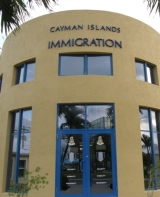Archive for March 29th, 2010

“Put me in a Jamaican prison, please!”
 (Jamaica Observer): Derrick Brooks, a 45-year-old man serving life for drug trafficking in a Cuban prison, has accused the Jamaican Government of refusing to facilitate his transfer to a Jamaican penal institution, despite willingness by the Cuban authorities to send him back home. According to Brooks, there are more than 31 Jamaicans languishing in Cuban prisons who are desperately in need of help, as they receive no rehabilitation, and are denied the opportunity to study or even visit the library in many cases. "I am on lockdown 24 hours a day although I might get just one day for a little sun…I have never been to the library — to study or to work — and I am a professional welder," he said.
(Jamaica Observer): Derrick Brooks, a 45-year-old man serving life for drug trafficking in a Cuban prison, has accused the Jamaican Government of refusing to facilitate his transfer to a Jamaican penal institution, despite willingness by the Cuban authorities to send him back home. According to Brooks, there are more than 31 Jamaicans languishing in Cuban prisons who are desperately in need of help, as they receive no rehabilitation, and are denied the opportunity to study or even visit the library in many cases. "I am on lockdown 24 hours a day although I might get just one day for a little sun…I have never been to the library — to study or to work — and I am a professional welder," he said.

HRC queries anonymity law
 (CNS): The chair of the newly formed Human Rights Commission has written to the government raising concerns about the recent implementation of the witness anonymity law, which will allow people to give evidence without revealing their identity to both the police and the courts. Richard Coles, a former Cayman Islands attorney general, told CNS that the HRC was not shown the bill before it went to the Legislative Assembly and there are a number of questions about it which may not only pose a threat to the rights of defendants but that it could also be unconstitutional.
(CNS): The chair of the newly formed Human Rights Commission has written to the government raising concerns about the recent implementation of the witness anonymity law, which will allow people to give evidence without revealing their identity to both the police and the courts. Richard Coles, a former Cayman Islands attorney general, told CNS that the HRC was not shown the bill before it went to the Legislative Assembly and there are a number of questions about it which may not only pose a threat to the rights of defendants but that it could also be unconstitutional.
Coles explained that the commission has sent a letter to the Deputy Governor’s Office pointing out a number of issues about the Criminal Evidence (Witness Anonymity) Law 2010 which could cause problems with regard to the success of the legislation. Coles noted that in general the right to cross examine a witness is a fundamental right of anyone being prosecuted but the commission recognises that exceptional circumstances call for exceptional measures. However, the HRC chair said the commission would be observing further erosion of rights that go the heart of a fair trial.
“We have two specific concerns about this particular piece of legislation,” Coles said, explaining that in section 2 the crimes to which the law may apply are set out as well as a clause indicating that the Governor in Cabinet may add to that list of offences without referring the bill back to the elected members of the Legislative Assembly for amendment. The list of offences is already considerably longer than the law it is modelled on in the UK, and this clause would enable the list to grow without input from the people’s representatives.
The chair noted that this essentially meant the elected arm of government had enabled the executive arm to change a primary piece of law without debate. “To my knowledge this is the first time the Legislative Assembly has delegated such authority to the Cabinet,” he added.
Coles explained that while Cabinet is normally responsible for subsidiary legislation or regulations, it is the Legislative Assembly that would amend the primary law and that in this case the separation of powers have been blurred. He said that this was a bad precedent to set and could also leave the legislation open to challenge. With a defendant’s rights already threatened, although understandable in exceptional circumstances, Cole noted any further erosion would be of significant concern.
The second issue that has caused Coles and his colleagues on the commission concern is that the law may not work as well as the authorities have intended, quite simply because the witnesses will not be entirely anonymous as their identities will be revealed to juries.
“Given the size of the Cayman Islands, how much comfort could a witness take if the jury will know who they are?” Cole asked. “It will be quite an issue to convince a witness that they do have genuine anonymity when they are known to the jury.” He suggested that this deficiency in the law may very well prevent the legislation from achieving its main goal.
“The HRC is as concerned about crime as everyone in the Cayman Islands, but had we been able to see the legislation before it made its way to the Legislative Assembly we may have been able to advise government on some of these potential problems,” Cole added.
He noted that while there was a need to address the current escalation of crime through changes in legislation and new ideas, “Good ideas need some thought,” and said the HRC was willing and able to assist in the thought.
With a number of laws in Cayman already needing to be addressed to make them compatible with the bill of rights, which will take effect in Cayman in November 2012, Coles said that the HRC has asked government to ensure that on all future legislation the commission is given the opportunity to look at it so it can at least advise government on any potential human rights abuses before new laws are enacted.
Check CNS throughout this week for more from Richard Coles on the HRC’s future plans, education campaigns, its current powers under the constitution, its future role once the Bill ofRights is implemented and its position on various other topical issues.

Teenagers arrested for KFC armed heist
 (CNS): Following a law enforcement operation on Sunday night in the George Town area the police have arrested three teenagers aged 16, 18 and 19 years. The RCIPS said the teenagers are currently in custody in connection with the armed robbery at KFC on the 23 March 2010. According to witnesses at about 10.30 p.m. on Tuesday 23 March, three men entered Kentucky Fried Chicken in West Bay Road one of which was armed with what appeared to be a firearm and another had a machete. (Photo by Dennie Warren Jr)
(CNS): Following a law enforcement operation on Sunday night in the George Town area the police have arrested three teenagers aged 16, 18 and 19 years. The RCIPS said the teenagers are currently in custody in connection with the armed robbery at KFC on the 23 March 2010. According to witnesses at about 10.30 p.m. on Tuesday 23 March, three men entered Kentucky Fried Chicken in West Bay Road one of which was armed with what appeared to be a firearm and another had a machete. (Photo by Dennie Warren Jr)
They men reportedly threatened staff before making off with a sum of cash from the premises. No shots were fired and no-one was injured. Police said enquiries into the case continue but did not state if the suspects are believed to have been involved with any of the other armed robberies that currently remained unsolved.

Men charged in hostage case
 (CNS): Police said today that they have now charged two men with abduction, keeping in confinement an abducted person, blackmail, and assault ABH in connection with the kidnapping of an unnamed local man in Grand Cayman on Thursday 18 March. The RCIPS also confirmed that they have now arrested a third man in connection with the same case. Earlier today (Monday 29 March) police said they arrested a Honduran national aged 39 years at the Immigration office in Elgin Avenue, George Town. He has been arrested on suspicion of abduction.
(CNS): Police said today that they have now charged two men with abduction, keeping in confinement an abducted person, blackmail, and assault ABH in connection with the kidnapping of an unnamed local man in Grand Cayman on Thursday 18 March. The RCIPS also confirmed that they have now arrested a third man in connection with the same case. Earlier today (Monday 29 March) police said they arrested a Honduran national aged 39 years at the Immigration office in Elgin Avenue, George Town. He has been arrested on suspicion of abduction.
The two men who have now been formally charged in relation to the incident are Wespie Mullings-Ramon, aged 36 years, and Charles Feliz Saunders-Webster, aged 28 years, both Honduran nationals, and they were expected to appear in court on Monday afternoon.
Police first revealed the arrest of the two men on Tuesday 23 March when Police Commissioner David Baines held a press conference to announce Cayman’s first ever hostage and ransom crime. Baines said that the parents of the victim had reported to police that they received a phone call on Thursday 18 March from a man claiming to have taken their son hostage. The suspect demanded a ransom of hundreds of thousands of dollars to secure their son’s release and warned he would kill the victim if they contacted the police. However, a few days later the victim managed to escape.
Police arrested Mullings-Ramon at about 1:00 pm on Saturday, 20 March, at Owen Roberts International Airport as he attempted to flee the country. Then around 10:30 on 23 March Saunders-Webster was also arrested at the airport as he too tried to flee the Cayman Islands. Police said they believed the two men are work permit holders. Police said at the time they were unable to release all of the details of the crime as they were still involved in an active investigation.
“There are details about the enquiry which, at the present time, I am not prepared to release. These details include the identity of the victim or his family, the exact figure of the ransom demand, the location of where the hostage was held, and how he escaped from his captors," Baines stated.
CNS will bring more details of the case from the courtroom as and when they are available.

Police sweep up suspects in recent murders
 (CNS): Following the three arrests the RCIPS made on Friday after a string of shootings in West Bay, police said today (Monday 29 March) that they have made two further arrests over the weekend in connection to the murder of Damion Ming and of Alrick Peddie. On Saturday, 27 March, a 22-year-old man was arrested in relation to the murder of Damion Ming and, police said they also arrested another man who is 23 in relation to the murder of Alrick Peddie. Both men were arrested in the West Bay area and on suspicion of murder.
(CNS): Following the three arrests the RCIPS made on Friday after a string of shootings in West Bay, police said today (Monday 29 March) that they have made two further arrests over the weekend in connection to the murder of Damion Ming and of Alrick Peddie. On Saturday, 27 March, a 22-year-old man was arrested in relation to the murder of Damion Ming and, police said they also arrested another man who is 23 in relation to the murder of Alrick Peddie. Both men were arrested in the West Bay area and on suspicion of murder.
Following these arrests police now have three men, aged 17, 23 and 35 years, in custody on suspicion of the murder of AlrickPeddie. Two men, aged 22 and 29 years, are now in custody in relation to the murder of Damion Ming.
On Friday, the RCIPS announced that they had arrested a 17-year-old man and a 35-year-old man in relation to the death of Alrick Peddie, who was shot and killed in West Bay on Wednesday, 24 March, on Willie Farrington Drive. They also said they officers had arrested a 29-year-old man in relation to the death of Damion Ming, who was gunned down in the Birch Tree Hill Lane area of West Bay last night, Thursday 25 March.
During a police press conference on Wednesday afternoon Police Commissioner David Baines appealed to the community once again to assist the police and revealed a new confidential help line. He said this is being manned by hand-picked officers that the community can have the utmost confidence in. He vowed that the line (949-7777) was completely secure.
Police enquiries into both murders are actively ongoing and anyone who has any information is asked to contact West Bay police station on 949-3999, or the new RCIPS confidential tip line 949-7777.

Miller to talk more on review at offshore conference
 (CNS): The recent major review of the future financial sustainability of the Cayman Islands economy will be under the spotlight at a special offshore conference in the US in May. The former US government official and economist who oversaw the recently completed Miller Report will discuss his findings at the Offshore Alert Conference in Miami. James Miller, who was a member of former US President Ronald Reagan’s Cabinet and a former Chairman of the US Federal Trade Commission, will offer his thoughts on how Cayman can keep its economy afloat in the modern era.
(CNS): The recent major review of the future financial sustainability of the Cayman Islands economy will be under the spotlight at a special offshore conference in the US in May. The former US government official and economist who oversaw the recently completed Miller Report will discuss his findings at the Offshore Alert Conference in Miami. James Miller, who was a member of former US President Ronald Reagan’s Cabinet and a former Chairman of the US Federal Trade Commission, will offer his thoughts on how Cayman can keep its economy afloat in the modern era.
His report, which has generated considerable attention locally for its emphasis on cutting spending and not raising taxes to stay competitive, will now be scrutinized by a wider audience. "Do not impose direct taxation" was the first of the report’s "Major Recommendations". Imposing such a tax "would be extremely deleterious to the very mobile financial services industry" and "would put the Cayman Islands at a competitive disadvantage compared to other international financial centres" and would "drive away business".
Difficulties obtaining work permits, either at all or in a timely manner, have long been a bane of offshore financial services providers in OFCs. Continuing on its pro-business theme, Miller’s report recommended that Cayman’s government increase the number of work permits, reduce work permit fees, and make the guest worker program more flexible.
Miller will expand on his report’s findings at the 8th Annual Offshore Alert Financial Due Diligence Conference, which will be held at The Ritz-Carlton, South Beach in May.
He will take part in a session which willinclude Michael Foot, who recently completed a review of all of the British OFCs for the UK government, including the Cayman Islands, as well as speakers from the US, Cayman, Bermuda and the Bahamas.
The conference will bring together more than 300 pro- and anti-offshore advocates and neutrals from more than 30 countries to discuss all aspects of OFCs, including products, services, tax issues, fraud, asset recovery, money laundering, compliance, investigations and intelligence-gathering.

Cable and Wireless breaks free from parent
 (CNS): Following its separation from the international group, Cable & WirelessCommunications said on Friday that it is now trading as an independent company with a new identity. The de-merger, which was completed last week, will see Cable & Wireless Communications focusing entirely on managing its full-service telecoms operations in the Caribbean, Panama, Macau and Monaco & Islands. This business was formerly known as Cable & Wireless International. (Left: Tony Rice, Cable & Wireless Communications Chief Executive Officer)
(CNS): Following its separation from the international group, Cable & WirelessCommunications said on Friday that it is now trading as an independent company with a new identity. The de-merger, which was completed last week, will see Cable & Wireless Communications focusing entirely on managing its full-service telecoms operations in the Caribbean, Panama, Macau and Monaco & Islands. This business was formerly known as Cable & Wireless International. (Left: Tony Rice, Cable & Wireless Communications Chief Executive Officer)
A new Cable & Wireless Communications identity has been launched along with a new corporate web site, cwc.com. Designed by brand consultancy, Elmwood, the new brand is an evolution of the iconic Cable & Wireless ‘blue globe’ logo, which has been in existence as the Group identity since 1986, the firm said in a release.
The telecommunications company said the new logo retains the heritage of the Cable & Wireless ‘globe’, but adds a three-dimensional aspect to its shape and while retaining the qualities of reliability and reassurance design represented Cable & Wireless Communication’s independent future.
Tony Rice, Cable & Wireless Communications Chief Executive Officer, said the de-merger presented an opportunity to further develop the business.
“The de-merger of Cable & Wireless has in effect returned our business to its shape prior to its entry into the UK market in the 1980’s. It will bring an increased focus to our business as we seek to realise the excellent growth opportunities that exist in our markets. We have a first-class management team in place to take the business forward. In this vein, our new brand identity captures the value of our heritage, while moving us to a more modern brand reflecting our independent future. I’m really excited about our future prospects,” he added.
Cable & Wireless Communications is composed of four operating units – the Caribbean, Panama, Macau and Monaco & Islands. The Cable & Wireless Communications brand has a presence in each of the business units, although local product brands are also used in several markets.

HR body calls for dialogue
 (CNS): In the wake of recent announcements concerning immigration, the country’s human resource professionals say they look forward to the changes being implemented not only in financial services but in other sectors as well, but want more dialogue with immigration. The president of the Cayman Islands Society of Human Resource Professionals has also called for more communication between the immigration boards and the business community about how they apply immigration regulations and what businesses need. Phil Jackson said the proposed new accreditation system should improve the situation for local employees as well as employers and strike a better balance.
(CNS): In the wake of recent announcements concerning immigration, the country’s human resource professionals say they look forward to the changes being implemented not only in financial services but in other sectors as well, but want more dialogue with immigration. The president of the Cayman Islands Society of Human Resource Professionals has also called for more communication between the immigration boards and the business community about how they apply immigration regulations and what businesses need. Phil Jackson said the proposed new accreditation system should improve the situation for local employees as well as employers and strike a better balance.
“There is a need to identify a balanced approach to Immigration, an approach that will create an environment in which businesses can succeed while ensuring Caymanians are being hired, developed and given opportunities to also succeed,” Jackson said. “Our policies need to ensure that Caymanians are given opportunities to fill positions in marketing, human resources, financial control, operations and information technology as well as financial services and these new directives definitely allow for that.”
Jackson added that there needed to be more dialogue between the immigration boards and businesses to gain a better understanding of the needs of the private sector and more discussion on specific issues for both sides. He noted the problems surrounding the way Regulation #6 in Business Staffing Plans is applied. “It often appears to be applied in an ad hoc manner,” he said. “There is also a failure among certain businesses and their HR departments to identify and develop a successor to employees which have a Regulation #6 attached to their work permit, which the accreditation system will also address.”
Following meetings held with the society following government’s announcements about the proposed changes to immigration, the members all said more dialogue would be warmly welcomed. Although the first changes are currently only applicable to the financial services sector, the society looks forward to the system being rolled out to other industries. According to a survey 75% of respondents support or strongly support the new immigration directives.
So far, the immigration regulations have been changed to make a number of important financial positions automatically key posts, offering key employ status to those work permit holders in those positions. The next stage that the Immigration Review Team plans to introduce is the accreditation system, which the chair of the IRT, Sherri Bodden Cowan, has said will be piloted with the financial services sector. She recently revealed that the IRT and immigration were aiming to have the legislative changes ready for the roll out by June or July this year. If the system works well then it will be implemented stage by stage across other sectors.
CISHRP members said they recognize the need to protect Caymanians and ensure that they are given every opportunity to secure employment and progress their careers in their chosen field, but at the same time there is a need for additional overseas employees to fill essential vacancies.
In a statement regarding the recent meetings, the society said that as human resource practitioners they had a part to play in fostering better relationships in the workplace and maintain a harmonious and diverse work force.
“The society is confident that the new directives will assist Caymanians entering the work force and developing their career paths. Under the accreditation system, employers will need to train, develop, and promote their Caymanian staff,” the CISHRP said in the statement.
The members noted that under the proposed system employers will need to maintain good work ethics, policies and employment practices, become involved in community programs and have talent development programmes in place in order to realize the benefits of the accreditation system.
“Those employers who are not accredited may find attracting and retaining good Caymanian talent and the processing of work permits not as easy as those with accreditation,” the HR professionals said.

Eight-year olds with Facebook pages
 (The Telegraph): Children as young as eight have Facebook pages and use other social media websites, ignoring the age restrictions, according to an official report. Ofcom, the media watchdog, said that one in five children, 19 per cent, between eight and 12 years old use social media sites such as Facebook, Bebo or MySpace. This is despite these sites officially having an age limit of 13. One in six parents didn’t know their children are on social networks. The report included internet audience data that showed that 37 per cent of home internet users aged between five and seven visited Facebook in October 2009. But it did not examine how many had profiles on the site.
(The Telegraph): Children as young as eight have Facebook pages and use other social media websites, ignoring the age restrictions, according to an official report. Ofcom, the media watchdog, said that one in five children, 19 per cent, between eight and 12 years old use social media sites such as Facebook, Bebo or MySpace. This is despite these sites officially having an age limit of 13. One in six parents didn’t know their children are on social networks. The report included internet audience data that showed that 37 per cent of home internet users aged between five and seven visited Facebook in October 2009. But it did not examine how many had profiles on the site.

Do fatty foods act like cocaine in the brain?
 (Health.com): Scientists have finally confirmed what the rest of us have suspected for years: Bacon, cheesecake, and other delicious yet fattening foods may be addictive. A new study in rats suggests that high-fat, high-calorie foods affectthe brain in much the same way as cocaine and heroin. When rats consume these foods in great enough quantities, it leads to compulsive eating habits that resemble drug addiction, the study found. Doing drugs such as cocaine and eating too much junk food both gradually overload the so-called pleasure centers in the brain. Eventually the pleasure centers “crash,” and achieving the same pleasure—or even just feeling normal—requires increasing amounts of the drug or food.
(Health.com): Scientists have finally confirmed what the rest of us have suspected for years: Bacon, cheesecake, and other delicious yet fattening foods may be addictive. A new study in rats suggests that high-fat, high-calorie foods affectthe brain in much the same way as cocaine and heroin. When rats consume these foods in great enough quantities, it leads to compulsive eating habits that resemble drug addiction, the study found. Doing drugs such as cocaine and eating too much junk food both gradually overload the so-called pleasure centers in the brain. Eventually the pleasure centers “crash,” and achieving the same pleasure—or even just feeling normal—requires increasing amounts of the drug or food.